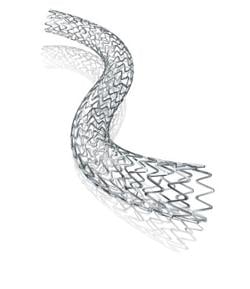
December 20, 2011 – Boston Scientific reported positive long-term data from the PERSEUS clinical program, which demonstrated favorable two-year safety and effectiveness outcomes for the Ion (Taxus Element) paclitaxel-eluting patinum chromium stent system versus prior-generation paclitaxel-eluting stents. Results were presented today by PERSEUS clinical program principal investigators Louis Cannon, M.D., of the Cardiac and Vascular Research Center of Northern Michigan in Petoskey, Mich., and Dean Kereiakes, M.D., medical director at The Christ Hospital Heart and Vascular Center and The Lindner Research Center in Cincinnati, at the Cardiovascular Research Foundation's annual Transcatheter Cardiovascular Therapeutics (TCT) scientific symposium in San Francisco.
"The PERSEUS trials build on the extensive TAXUS clinical program and extend the consistent outcomes seen with prior-generation paclitaxel stents to the platinum chromium Ion Stent platform," said Cannon. "The excellent clinical results at two years confirm the Ion stent's safety and efficacy in workhorse lesions and suggest superior performance relative to bare-metal stents in small vessels. In addition, I have found the new alloy and stent design to offer increased flexibility, visibility and deliverability."
PERSEUS Workhorse and Small Vessel Trials
Cannon presented results from the prospective, randomized pivotal PERSEUS Workhorse trial, which demonstrated comparable safety and efficacy at two years for the Ion Stent compared to the Boston Scientific Taxus Express stent in more than 1,200 patients with de novo workhorse lesions. Both stents showed similar rates of composite measures for target lesion failure (TLF) and major adverse cardiac events (MACE). Individual safety measures of cardiac death, myocardial infarction (MI) and stent thrombosis remained low at two-year follow-up, demonstrating durable outcomes and successful transfer of the paclitaxel drug and polymer technology to the platinum chromium thin-strut platform.
Results were also presented from the PERSEUS Small Vessel trial, which compared the Ion Stent in 223 patients with small vessels (greater than or equal to 2.25 to <2.75 mm diameter) to a matched historical control group of 125 patients treated with the Express bare-metal stent. The Ion Stent demonstrated similar safety and superior performance at two years compared to the Express Stent with significantly lower propensity-adjusted rates of target lesion revascularization (TLR, 7.1 percent vs. 20.8 percent, p=0.009) in patients with lesions in small vessels.
PERSEUS-ATLAS Trial Comparison
In an analysis of the PERSEUS and TAXUS ATLAS clinical trial programs, Kereiakes presented results that demonstrated safety outcomes favoring the Ion (Taxus Element) stent compared to the Boston Scientific second-generation Taxus Liberte paclitaxel-eluting stent. The study compared pooled patient-level data from 2,298 patients enrolled in the PERSEUS (Ion stent) and TAXUS ATLAS (Taxus Liberte stent) trials. Propensity-matched results revealed that the Ion Stent achieved significantly lower rates of MACE at two years (11.5 percent vs. 15.1 percent, p=0.04) and a numerically lower rate of TLF (8.2 percent vs. 11.0 percent, p=0.07), driven mainly by a reduction in MI (2.5 percent vs. 4.9 percent, p=0.02).
"The significantly lower rates of MACE and MI in this propensity-matched analysis demonstrate that the platinum chromium alloy, new stent design and thinner struts of the Ion Stent may favorably influence clinical outcomes," said Kereiakes. "The PERSEUS trial results build confidence in this next-generation platinum chromium alloy, which, in my experience, offers noticeable performance improvements including enhanced flexibility, visibility and radial strength."
The Ion stent system features an innovative platinum chromium alloy and improved stent design to offer greater radial strength, enhanced deliverability and exceptional visibility. The thin-strut stent is designed for improved conformability, minimal recoil, and uniform lesion coverage and drug distribution. The advanced low-profile delivery system facilitates precise stent delivery across challenging lesions.
The Ion stent system received U.S. Food and Drug Administration (FDA) approval in April 2011.
For more information: www.bostonscientific.com


 January 05, 2026
January 05, 2026 









